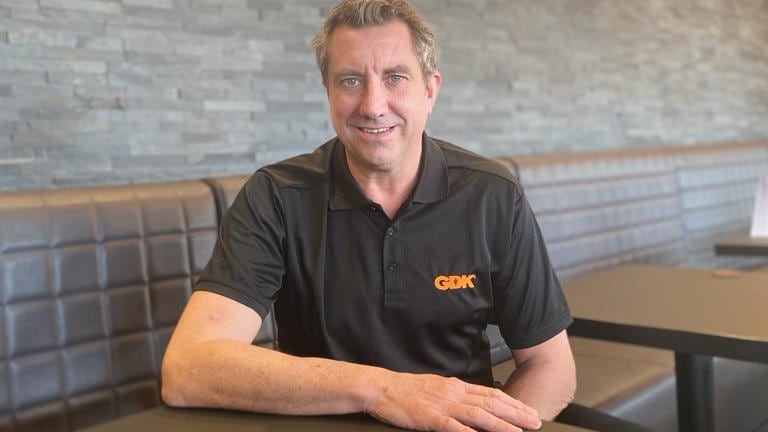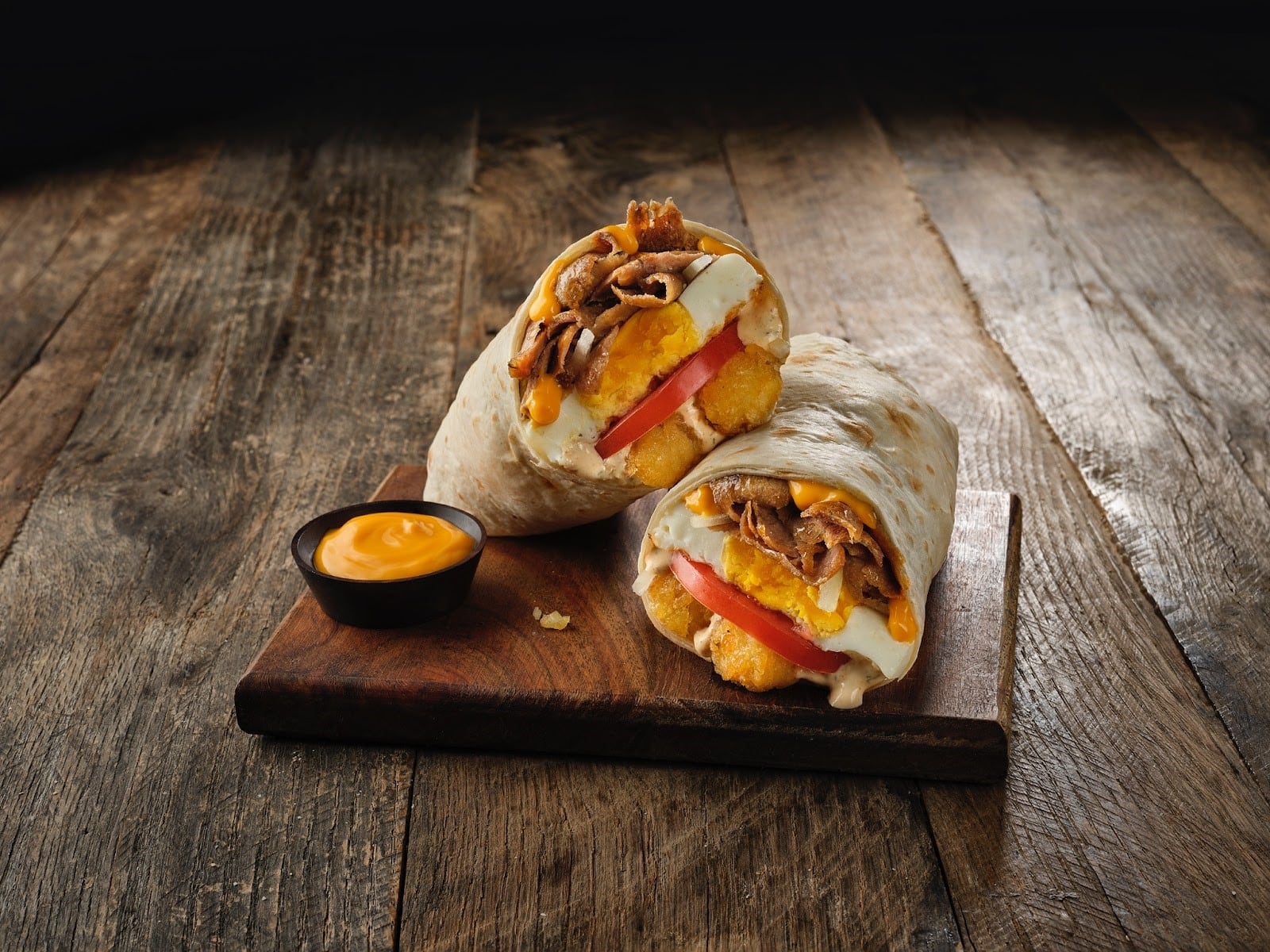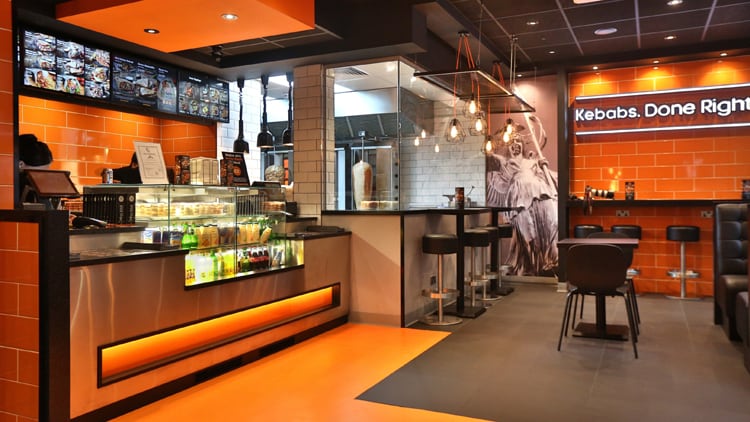How many of German Doner Kebabs’ (GDK) sales are rung up after the pubs kick out? Given that its namesake product is the UK reveller’s default late night snack you would be forgiven for thinking ‘a lot’. But you would be wrong. Very wrong. Astonishingly, just 4% of the 144-strong group’s business is done after 11pm.
“Eating kebabs after quite a few pints is something of a national past time,” says the Glasgow-headquartered group’s UK boss Simon Wallis. “We don’t hide away from that. But our restaurants are positioned in a completely different way.”
Indeed, GDK sites don’t tend to be located near independent kebab places. With their orange, black and grey colour palette and banks of digital ordering screens they are typically found in places where a kebab shop would look incongruous, not least shopping centres and service stations. These are family-friendly restaurants firmly of the fast-food model, and a million miles from the glass countered kebab houses found the length and breadth of the country.
Having joined the business from Domino’s a little under three years ago, Wallis has been on a mission to challenge the notion that kebabs are a late-night item only. “That perception is our single biggest barrier,” he adds. “We have addressed that with the products we serve and our locations.
“We are a QSR brand that offers something very different to independent kebab shops. We have more in common with McDonald’s. The focus is now on the marketing.”
To this end, last summer, GDK launched its Doners Worthy Of Daylight campaign. Featuring skinny, fresh-faced models brandishing (but not eating) kebabs, the ‘fame-building’ ads were shown on websites, social media platforms and billboards (with 3% of net sales going on marketing, the group is not short on budget).
“The campaign is ongoing and is already having a noticeable effect. It will build and build,” says Wallis, who is employed by GDK’s owner Hero Brands, which is also behind healthy salad-concept Choppaluna, NYC-inspired food and cocktail restaurant Dirty Bones and the food output of YouTube collective The Sidemen.
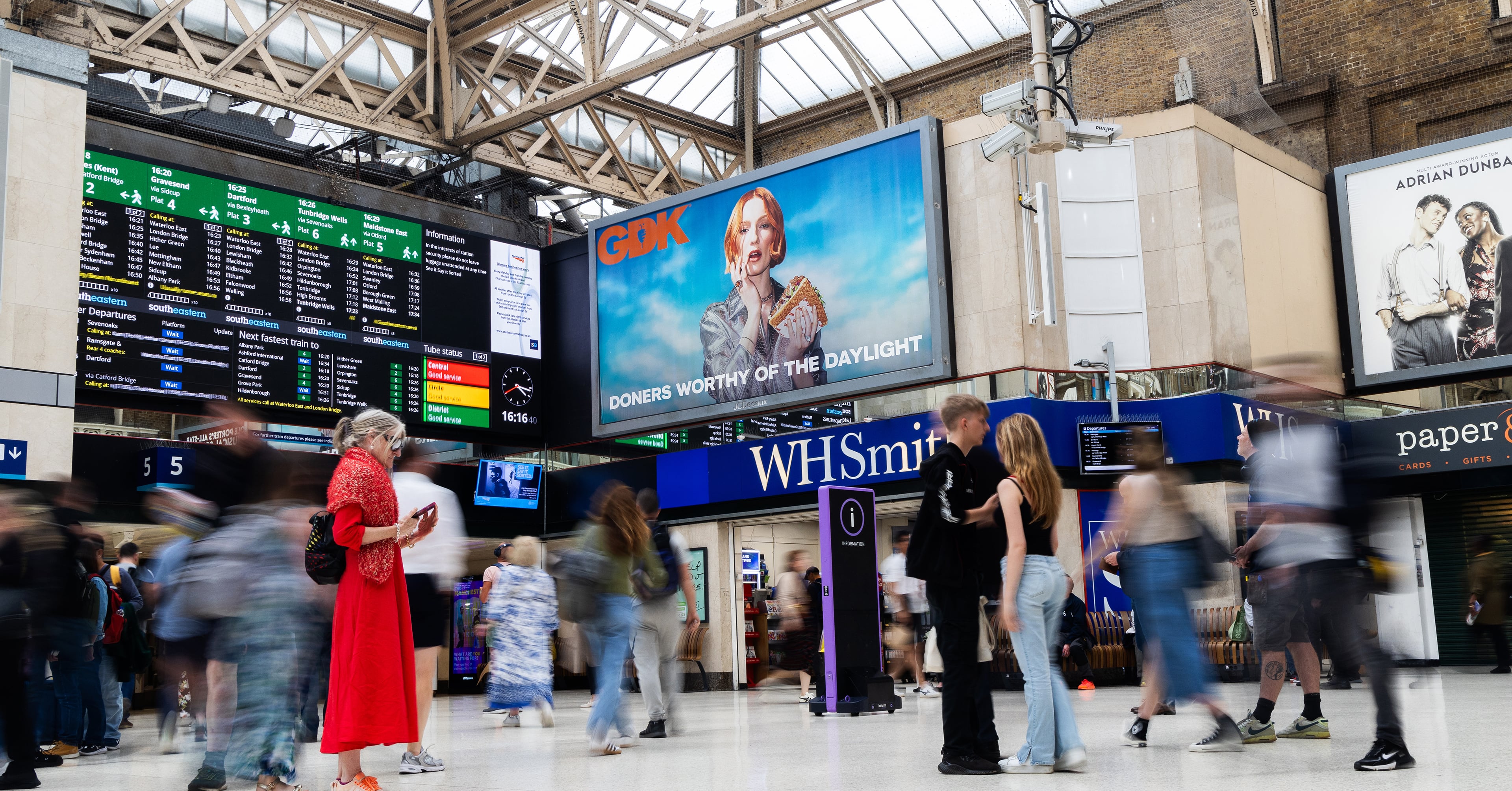
Berlin born (sort of)
There are no GDK restaurants in Germany, but as the name suggests the brand is inspired by the country’s kebab culture. High levels of Turkish and Kurdish immigration from the 1960s onwards have seen kebabs become a street food staple that – unlike the UK – is enjoyed in the daytime as well as late at night.
Part of the reason for this is that the product has evolved to be healthier than those offered in the UK with a higher-ratio of salad to meat and – sometimes – also featuring roasted vegetables. Another key difference between the German and UK kebab landscapes is that beef (sometimes veal) is used in place of lamb. As such GDK offers beef and chicken alongside a vegan ‘meat’ option.
Inspired by Berlin’s booming kebab scene in particular, Farshad Abbaszadeh launched a restaurant entitled simply Doner Kebab in Dubai in 2013. Soon after, Hero Brands founder Athif Sarwar bought the international rights to the brand with the first UK GDK site opening in Birmingham in 2015.
The UK is now considered the home market for the brand but there are now GDK restaurants in Sweden, Canada, Saudi Arabia and the US. Many more international markets look set to follow: the GDK corporate website claims that there are more than 1,000 locations in development across the world.
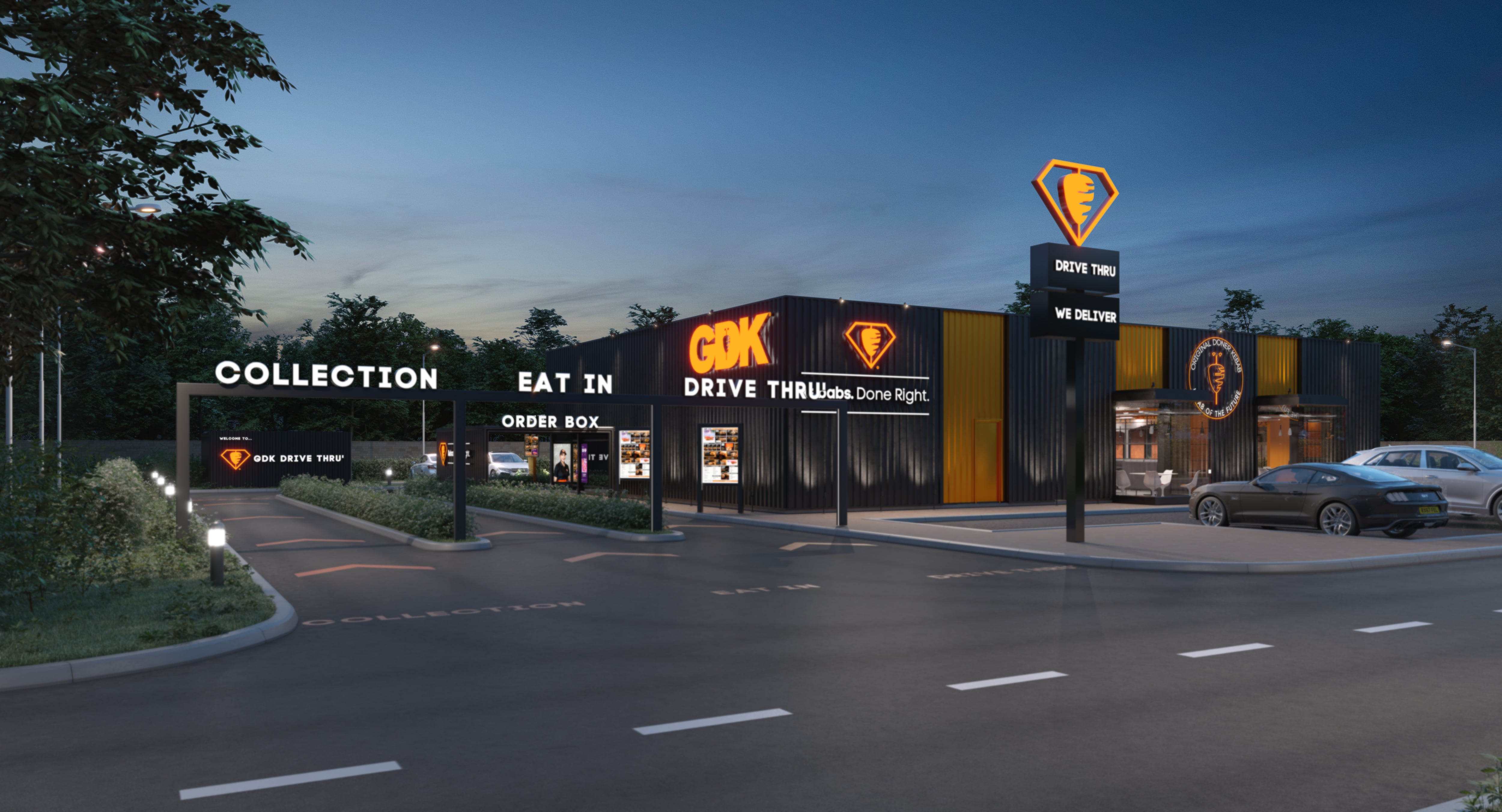
A category of one
GDK’s capital-light franchise model has allowed it to expand rapidly. In 2021 it was clocked as the fastest growing restaurant brand in the UK after it opened a total of 47 sites in a 12-month period. “An obvious benefit of the model is that you can move very quickly,” says Wallis, who is a veteran of the franchise space having spent 13 years at Domino’s (he left as chief transformation officer).
At present there are around 50 UK GDK franchisees in total with the largest overseeing around 26 sites, however Wallis says the plan is to grow with fewer, ‘more capable’ franchisees. The company doesn’t have any company-owned restaurants, but this is something he wants to remedy. “Having our own sites gives us skin in the game and also allows us to train our own people and develop the product.”
A key difference between GDK and most QSR franchises in the UK is that the brand is working in a space that is almost entirely comprised of independents. For Wallis, this is very exciting. “Opportunities like this don’t come around that often,” he says. “We want to do for the kebab what McDonald’s did with burger, what Subway did with the sandwich, and what Domino’s did with pizza.”
Another benefit of having almost zero branded competitors (there is a much smaller franchise brand called Doner Shack) is that experienced QSR franchise operators can easily dip their toe in the water. One of the principal barriers to growth in the franchise space is that - in general - master franchise holders won’t allow franchisees to have more than one brand in any given section of the market. With no crossover, seasoned franchisees in the more established pizza and fried chicken categories, for example, can use their expertise to help grow the GDK brand.
Although GDK is no longer the fastest growing restaurant brand in the UK – an accolade which has since transferred to fried chicken brand Wingstop for the past few years – its expansion can hardly be described as sluggish. At least 25 new GDK sites are expected to open in the UK this year as part of a grand plan to hit 300 sites within the next five years.
“There is a huge amount of white space,” says Wallis. “We are well penetrated in London with over 50 locations but there are other places we could do a lot more. For example, we have yet to launch any restaurants in Oxford or Cambridge and we only have two in Manchester.”
Soon after it was acquired by Hero Brands, the company trademarked GDK. A decade on, brand recognition is such that the business is in the process of borrowing from the playbook of Kentucky Fried Chicken in the early 1990s and switching over to its initials only.
“Let’s face it, Germany is not a nation that’s known for its food,” says Wallis, who also acknowledges that the average UK consumer is not aware of German kebab culture. “GDK is the stronger brand in my opinion. It just sounds a bit cooler. At the moment, it’s a mix. But moving forward we will focus on GDK.”
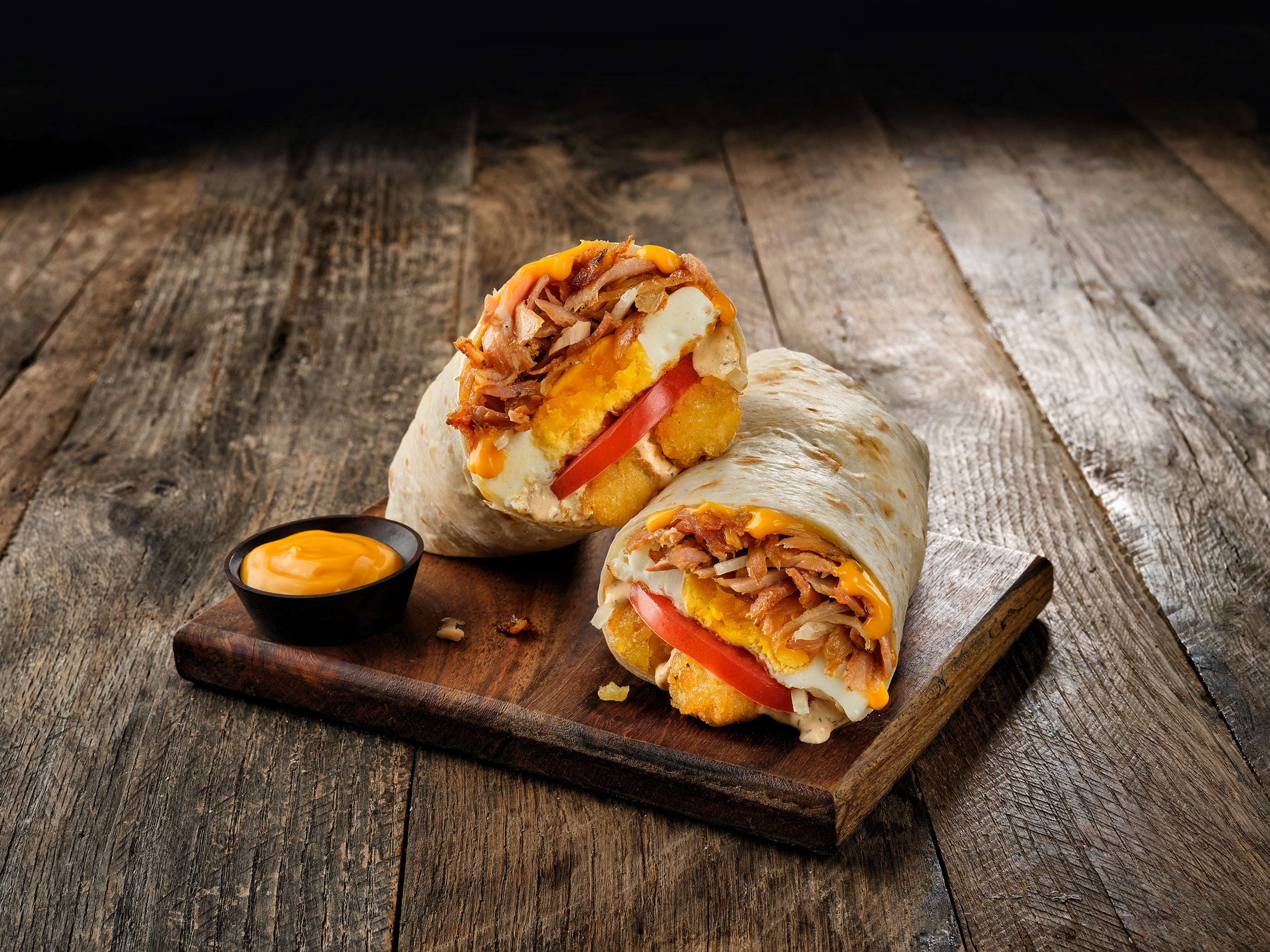
Kebabs for breakfast?
GDK’s core product offer is described by Wallis as being very similar to what you’ll find on the streets of Berlin, but its menu is more extensive than a typical German doner kebab vendor. Options include doner-meat filled burgers, salad boxes and even quesadillas. “We have innovated to give people more options and make our products more convenient,” Wallis says.
Last year, the group hit the headlines with its play for the early morning market that saw a handful of sites offer breakfast options including the ‘Big Breakfast Wrap (doner meat, two eggs, hash brown bites, sliced tomatoes, onion melted cheese and yoghurt sauce). A year or so on, the trial is ongoing with a total of five sites offering the menu including GDK’s debut train station site, which launched earlier this year in London Victoria.
“We have proved our product can work across multiple day parts. This is an extension of that,” says Wallis, who is eying another initiative that could once again see the group enjoy a lot of attention in the UK press.
Late last year, the master franchisee for GDK in Saudi Arabia launched what is thought to be the world’s first drive-thru kebab restaurant. While there are no concrete plans to bring the concept to the UK, Wallis certainly seems keen on the idea.
“We will take what has been learned in the Middle East and apply it to the UK. But we have already done some of the work. Speed is essential in that space. We have recently completed a project that has got bump times down to two-and-a-half minutes at our higher volume sites.”
Breakfast kebabs and drive-thrus might be more about generating publicity than something that can scale, but there’s no doubt that the brand’s footprint and marketing clout is changing the way many people view kebabs.


